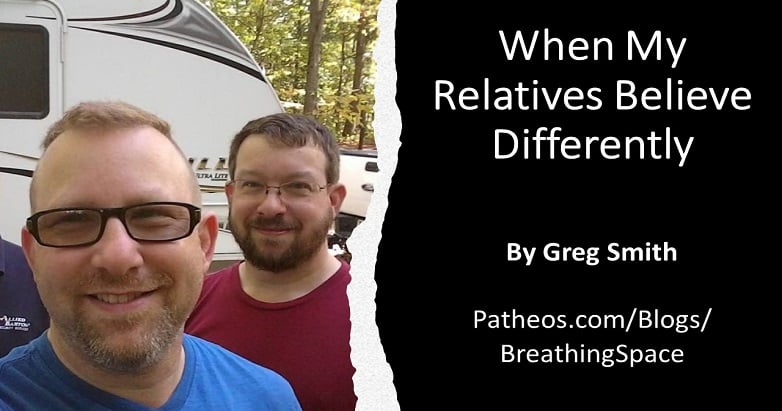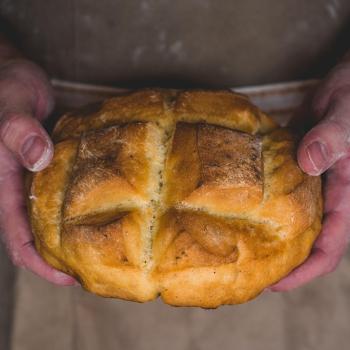How do you handle it when your relatives believe differently? Cain killed Abel because of a difference in their faith—but your religious differences don’t have to end in tragedy.

Growing Up in His Shadow
Two people could not have been more different in their faiths, even though we had the same beginnings. My older brother and I are twenty-two months apart, a good age gap to grow up as best friends and worst enemies. There were times when he was protective of me, and other times he felt like wringing my neck. Often, I felt glad to have an older brother to look up to, but just as often I grew tired of the compare and contrast game. My schoolteachers had taught Paul just 2 years before, and frequently drew parallels between us. My friends were the younger siblings of his friends. Our siblings-gang played together and fought together. In my mind, it was hard to see which would win out, the love or the conflict.
To make matters worse, we shared the same interests. After high school, we went to the same university and joined the same Baptist Student Union (think fraternity/sorority for church kids). We majored in the same course of study. I had the same professors, who once again played the comparison game. To my relief, Paul began to feel God calling him to ministry, while I was still planning on a career in archaeology or anthropology. Imagine my relief—suddenly, a differentiation!
Differentiation and Denominational Differences
Not long before Paul went off to the Baptist seminary in Kansas City, Missouri, God annoyed the hell out of me by calling me into ministry as well. I had to put a stop to all the similarities. Enough was enough! So, I stuck out my bottom lip, asserted my independence, and chose an altogether different Baptist seminary in Richmond Virginia. (Not so different, after all, was I?)
As much as I tried to pull away from him, it was Paul who removed himself from our conservative upbringing. He attended a moderate seminary that fundamentalists took over while he was there. The pain of that, combined with other factors, influenced him to be quite liberal by the time he graduated. I attended a seminary staffed by moderate to liberal professors who had been fired by their seminaries during the “conservative resurgence” of the Southern Baptist Convention. Adhering to the teaching of my conservative pastors, I resisted this moderate teaching. By the time I was done with seminary, I was quite conservative in reaction to my “liberal” professors. I was moving to the right, while my brother shifted to the left.
Paul saw the writing on the wall in his own denomination, so he left the Southern Baptists and joined the United Church of Christ. I, on the other hand, remained in the Southern Baptist Convention as it became increasingly conservative. I butted heads with the most traditional in my churches, but for the most part, I was in line with Baptist beliefs.
Our church styles could not have been more different. He embraced the liturgy that Baptists jokingly called “bells and smells.” Paul says it was not high-church, but decidedly middle-church. But to us in the Baptist low-church tradition, it seemed quite formal.
Is Blood Thicker than Theology?
While we followed the same path of ministry, two brothers could not have been more different. Name a theological hot button topic, and we were on opposite sides of the issue. You might say we were as polar opposite as North and South. This was fitting since he moved to Connecticut while I remained in Dixie.
When we got together for holidays and vacations, we had to outlaw certain topics to keep the peace. As children we had fought over things like who got to ride shotgun. As adults, we wrestled verbally over issues like who is acceptable in the realm of God, or whether the Bible is the word of God. I prayed for him because I wasn’t sure he was even saved.
Coming Together
These days, even though our stylistic differences remain, our theologies are nearly on point with one another. Not because I brought him around to my way of thinking but because we loved each other through our differences. Our mother always raised us to believe that family was family and love was love—despite any differences. If we had allowed discussions to become debates, debates to become arguments, and arguments to become enmity then we would not be in the place we are today. But because we were able to recognize each other’s personhood regardless of our opinions, the door was always open for relationship and conversation. When I began to rethink some of my theology, I knew I could talk with my brother because he had deconstructed his theology many years before. It was our relationship that created the opportunity for my continued spiritual growth.
August 11 is the Hindu celebration of Raksha Bandhan, which means, “The bond of protection, obligation, or care.” According to Rakhibazaar, “It is the celebration of the strong bond that exists between a brother and sister with a beautiful handcrafted ‘Rakhi’. The rakhi thread symbolizes love, affection, care, respect, and adoration which the siblings hold in their hearts for each other.” This reminds me of the Christian hymn that goes, “Blest be the tie that binds our hearts in Christian love / The fellowship of kindred minds is like to that above.” Many of my churches used to sing that song while holding hands in a circle after celebrating the Lord’s Supper. I would imagine a tie, like the Rakhi, binding spiritual siblings together.
This same concept of ties that bind ought to apply not just to Hindus at Raksha Bandhan or Christians at Communion, but to the whole human family. Whether we are Muslim, Hindu, Buddhist, Sikh, Jewish, Christian, or anything else, we are family. Family is family, and love is love. When it comes to a choice between relationship and theology, relationship should win every time.
I’ve heard it said, “You do not know whether by your love you might bring them around to your way of thinking.” But life on this planet has never been about bringing the other person around to your way of thinking. It is about recognizing the interconnectedness of all humanity. It is about finding love in relationship with one another and with our Creator, regardless of our religion or tradition. Your story may not end like mine, with siblings in agreement. But even so we honor God when we live the principle of the Hebrew scripture, “Behold how good and pleasant it is when brothers and sisters dwell together in unity (Psalm 133:1).”
For More on This Topic…
This article could be considered a prequel to “When My Brother is Wrong: 8 Steps to Peace” Click here to read more.












